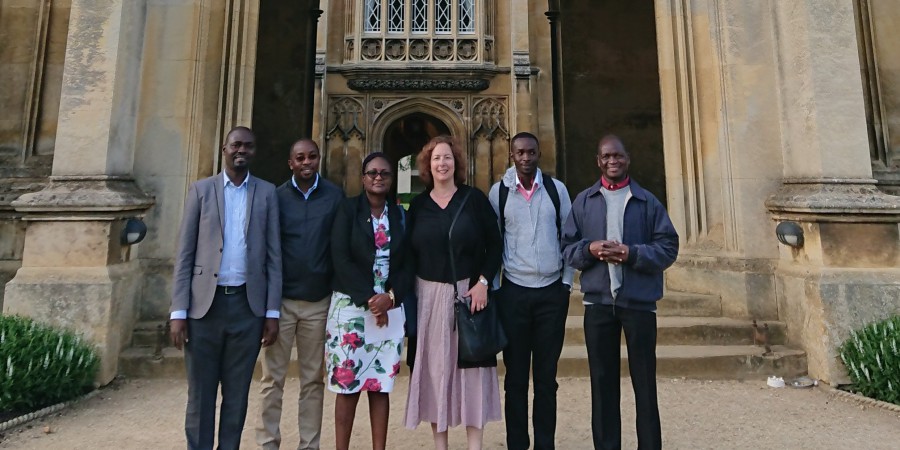Uganda Cancer Institute Team visits Cambridge

Written by Dr Jackson Orem, Executive Director Uganda Cancer Institute.
A team from Uganda Cancer Institute (UCI), Kampala, Uganda visited University of Cambridge from 9th - 31st May 2019. The team comprised of Dr. Jackson Orem (Executive Director Uganda Cancer Institute and Head of Delegation) Dr Joyce Balagadde-Kambugu (Head Peadiatric Oncology), Dr. Nixon Niyonzima (Head Research and Training), Mr Ezra Anecho (Grants and Administration) and Mr. Godfrey Osinde (Head Pharmacy and Nuclear Medicine). The focus of the visit was to deepen and strengthen the emerging collaboration between the CRUK Cambridge Cancer Centre, University of Cambridge and the Uganda Cancer Institute which has been facilitated by the Cambridge-Africa Programme. The main areas of interest are in Cancer training, research, clinical service improvement and public health. The team met with key leaders in Cambridge and associated institutions including Cambridge Global Health Partnerships, the CRUK Cambridge Centre, CRUK Cancer Research Institute, Cambridge-Africa and the Department of Pathology as well as the University teaching Hospital at Addenbrookes. The main objectives were to explore potential areas of mutual interest for research collaborations across the spectrum of disciplines of oncology and cancer research (pediatric oncology, radiation oncology, medical oncology and haematology, gynecologic oncology and basic science research). Opportunities for training were explored through student exchange programmes at various levels. The visit explored mechanisms for funding to support and sustain the collaboration. Finally the visit was also to further links with existing Cambridge collaborators such as Dr Suzanne Turner and Dr Maike de la Roche and colleagues at CRUK CI.
The team received an overwhelming and enthusiastic welcome from the entire leadership and staff of all the institutions visited. The individual discussions with key leaders climaxed with a well-attended and highly interactive talk on cancer and global health on 23 May 2019 at the CRUK Cambridge Institute. What has emerged out of this visit can be summarized under key areas for a new collaboration with a focus on training the next generation of cancer researchers/clinicians for low and middle income countries such as Uganda. This is paramount given the rising burden of cancers in these countries. Despite this, cancer has not been prioritized and insufficient resources have been allocated by both local government and development partners including donor countries. We agreed that popularizing cancer research among young students should be developed through a Summer School which is to take place annually. We intend to attract talented students who will eventually study for PhDs. The new summer school will start as early as 2020 with 2 places reserved for East African participants Secondly, opportunities for international electives for students from Uganda and the east African region should be created focusing on cancer to develop the next generation of cancer researchers. We also agreed to strengthen training for existing UCI staff through interaction between Cambridge and the Uganda Cancer Institute across the full spectrum of topics from basic to clinical and public health research. This will be based on the diseases profile seen in Uganda and so relevant to the needs on the ground. Clinical research, with particular emphasis on diagnosis and presentation of disease, will be prioritized. Multi-disciplinary team building aimed at improving diagnostic processes will be undertaken. There will be training using online tools for improving the quality of oncology services applicable to early diagnosis, staging and prognostication.
This visit received an overwhelming reception within Cambridge and produced an instructive engagement in line with the University’s bottom up approach. By working with University of Cambridge, the Uganda Cancer Institute has a lot to gain through harnessing the immense capacity in Cancer science and applied research in prevention, early detection and diagnosis as well as effective treatment. The emphasis on training will encourage the choice of a career in cancer research for the next generation of scientific leadership in Uganda who will be in a better position to tackle the emerging high cancer burden in the region. The framework for addressing this challenge will emerge from innovative research that will certainly develop from this collaboration and which will be of mutual scientific satisfaction. The key to this will be by having well Thought-out programs, applying the right Technology, emphasizing Training and Transfer of Know-how and doing all Together i.e. the (5Ts).

